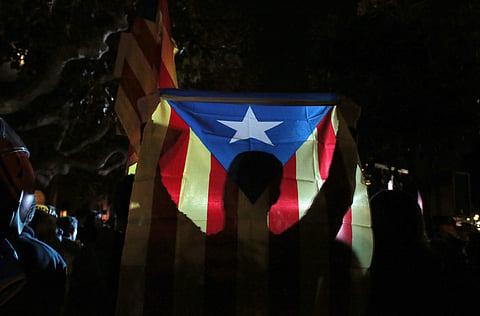

MADRID: A judge in Madrid on Thursday ordered eight ministers of Catalonia's deposed government, including former regional vice president Oriol Junqueras, to be jailed pending further probes into their role in the independence drive.
They are accused of sedition, rebellion and misuse of public funds.
Here are the main points of judge Carmen Lamela's ruling:
- 18-month independence drive -
Lamela goes back to regional elections in September 2015, when a separatist coalition won an absolute parliamentary majority.
They drafted an 18-month roadmap to independence, which eventually led to the Catalan parliament declaring it was breaking away from Spain last Friday.
Lamela points to "systematic and frontal disobedience" of all decisions by the Constitutional Court along the way, such as holding an independence referendum on October 1.
- Protests -
She also mentions the ANC and Omnium Cultural, grassroots pro-independence associations of which several former ministers are members, which she says "acted as the civilian wing of the uprising backed by regional government authorities by encouraging mobilisation."
Lamela points to a demonstration in Barcelona in September that saw Spanish police raiding a Catalan government office as part of a probe into the upcoming referendum trapped inside the building for hours as protesters gathered outside.
Police vehicles were vandalised, and a lawyer accompanying the court-ordered raid eventually had to be evacuated "through the theatre next to the building, camouflaged and blending in with the audience leaving the theatre."
The judge also says many people were mobilised to try "to stop police forces from entering centres where voting was taking place" in the referendum.
The vote on October 1 was marred by police violence, with officers in some cases firing rubber bullets at people trying to defend polling stations.
- Catalan police -
Lamela says the defendants also planned to have "exclusive control of the Mossos d'Esquadra, a (Catalan) police squad with more than 17,000 armed personnel" after independence was declared.
She says that during the referendum, most of the Mossos remained "passive" while Spain's Civil Guard police force tried to stop people from voting.
But she also accused them of going as far as "confronting" Civil Guard officers and of informing separatist demonstrators about the movements of the Civil Guard and the national Spanish police.
- Risk of escape -
Lamela decided there was a risk the former ministers could escape if they were not detained, given axed Catalan leader Carles Puigdemont had gone to Belgium and refused to come to Madrid to testify as summoned.
"Let's remember that some of the defendants have already gone to other countries, dodging possible penal responsibilities," she argued in her ruling.
She also gave as a reason the gravity of the offences they are accused of, which could have tempted them to flee.
Lamela also pointed to the risk they could hide or destroy evidence given their high-ranking positions until just a few days ago.
As such, she ordered preventive detention.
- 25 years in jail -
According to the ruling, the former ministers "risk sentences of up to 25 years in prison for rebellion," even if Spain's penal code says the offence can carry up to 30 years prison.
Sedition, says Lamela, could be punished by up to 15 years and eight years for misuse of public funds.